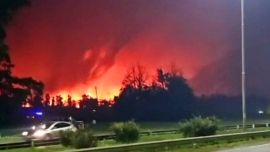Environmental NGO Greenpeace on Friday condemned as “a direct attack on Argentines’ water” President Javier Milei’s announcement that he intends to amend a law protecting the country’s glaciers in order to facilitate multi-million-dollar mining investment.
In a speech on Thursday, Milei said he would seek to redefine the boundaries of the periglacial zones protected by law, which Greenpeace says are critical for water storage and climate regulation.
“The environmental rollback proposed through this amendment will put access to water at risk for millions of Argentines,” said Agostina Rossi Serra, biodiversity specialist at Greenpeace Argentina, in a statement.
This law would “allow each province to determine what constitutes a periglacial zone, and the consequence will be a major wave of investment in mining,” the President said hours after announcing a bilateral trade framework with the United States that includes the extraction of critical minerals.
Argentina's current Glacier Law, in force since 2010, bans activities that could damage glaciers and periglacial areas, such as mining and hydrocarbon exploitation.
According to Greenpeace, the amendment “would open the door to activities that threaten the integrity of glaciers and their surrounding ecosystems, putting freshwater sources at risk”.
This could leave the “glaciers exposed to a far greater risk of contamination, destruction and disappearance”, the environmental organisation added.
But Milei sees an opportunity for wealth in Argentina’s part of the Andes, the country’s largest mountain range.
Environmentalists “would rather people starve than touch anything … a primitive way of thinking”, the President said.
“We are underusing the mountain range. We could multiply our exports 12-and-a-half times,” he told an event in Corrientes Province, 900 kilometres north of Buenos Aires, referring to copper, gold, lithium and rare earths.
Argentina is one of almost 50 countries worldwide that have glaciers. Two thousand of them cover an area of 310,000 hectares, according to the country’s Biodiversity Information System.
The so-called “periglacial law” will form part of a package of reforms the government is pursuing to liberalise the economy.
Other projects on the agenda include labour and tax reform, which the Executive will seek to pass in Congress after December, when the new legislators elected in the victorious midterm vote in October take office.
– TIMES/AFP





















Comments